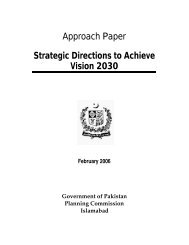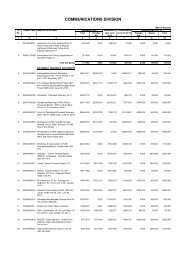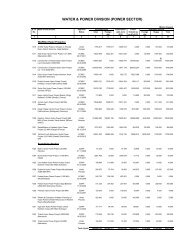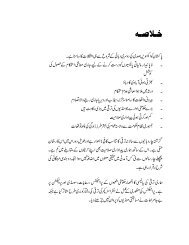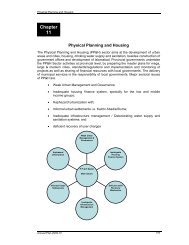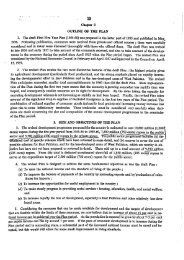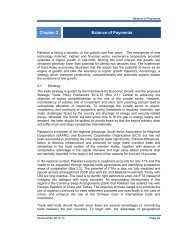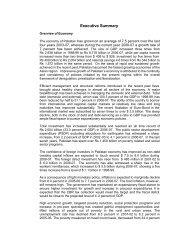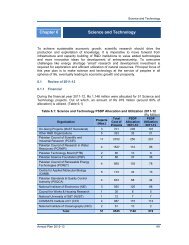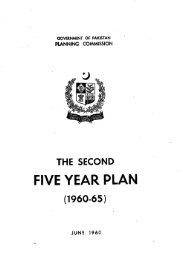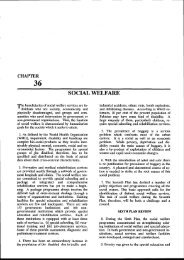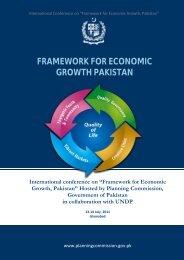Manual for Development Projects - Planning Commission
Manual for Development Projects - Planning Commission
Manual for Development Projects - Planning Commission
You also want an ePaper? Increase the reach of your titles
YUMPU automatically turns print PDFs into web optimized ePapers that Google loves.
<strong>Manual</strong> For <strong>Development</strong> <strong>Projects</strong><br />
Provincial <strong>Development</strong> Working Party (PDWP)<br />
6.9 Each Province has a Provincial <strong>Development</strong> Working Party which is headed by the<br />
Chairman, <strong>Development</strong> Board/ Additional Chief Secretary (<strong>Development</strong>) and includes<br />
Secretaries of the Provincial Departments concerned with development, as its members. The<br />
Provincial <strong>Development</strong> Working Party scrutinise various projects <strong>for</strong> inclusion in the Annual and<br />
Five Year Plans. It is competent to approve projects upto a certain financial limit. <strong>Projects</strong><br />
exceeding this limit are submitted to the Central <strong>Development</strong> Working Party <strong>for</strong> approval.<br />
Go To Top<br />
Sanctioning Powers of Approving Authorities<br />
6.10 Initially in 1959, all the schemes of the Provincial Governments and Federal Ministries<br />
costing Rs 2.5 million non-recurring and/or Rs 0.5 million recurring were required to be submitted<br />
to ECNEC <strong>for</strong> approval through the <strong>Development</strong> Working Party. The schemes costing less than<br />
the said amounts used to be sanctioned by the Provincial Governments themselves. Federally<br />
sponsored schemes within the above-mentioned limits used to be sanctioned by the Federal<br />
Ministry itself in consultation with the Ministry of Finance. The CDWP had no sanctioning power.<br />
Subsequently with more and more experience and expansion in the development programmes,<br />
these limits were enhanced and sanctioning powers were gradually decentralized and delegated to<br />
various authorities. In accordance with the decisions of the NEC, dated 21-5-1987, the ECNEC,<br />
dated 9-7-1987 and the NEC, dated 20-5-1991, the sanctioning powers of various authorities were<br />
enhanced. A Task Force headed by Deputy Chairman, <strong>Planning</strong> <strong>Commission</strong> (January, 1995)<br />
reviewed the financial powers of various authorities/Fora (CDWP/ECNEC etc) and decided that<br />
existing powers are adequate and should continue. The existing powers in <strong>for</strong>ce (details at<br />
Annexure-XX) are briefly as follows:<br />
AUTHORITY SANCTIONING POWER<br />
(I) ECNEC<br />
(ii) Cabinet<br />
Committee on<br />
Energy Replaced<br />
with Economic<br />
Coordination<br />
Committee (ECC)<br />
http://hd2/pc/popup/ch6_p.html<br />
All schemes costing Rs 100.0 million & above (Annexure-<br />
XX-A and XX-AI)<br />
(a) Energy Related <strong>Projects</strong><br />
A Cabinet Committee on Energy with the Prime Minister as<br />
its Chairman, Finance Minister as Vice Chairman, and<br />
Minister <strong>for</strong> <strong>Planning</strong> and <strong>Development</strong>, Minister <strong>for</strong><br />
Petroleum and Natural Resources and Minister <strong>for</strong> Water and<br />
Power as its members was responsible inter- alia to approve<br />
operational plans, policies and development schemes costing<br />
more than the powers of approval enjoyed by the Ministry or<br />
the concerned agencies. Cabinet Committee on Energy was<br />
abolished vide ECC decision in Case No.ECC-55/3/96, dated<br />
03.03.1996. All cases within the purview of the CCE was to<br />
be submitted to the ECC through the Technical Committee on<br />
Energy and the <strong>Planning</strong> <strong>Commission</strong>. However, vide ECC<br />
decision dated 28-1-1997 all projects related to Energy or to<br />
Page 4 of 17<br />
9/23/2010



